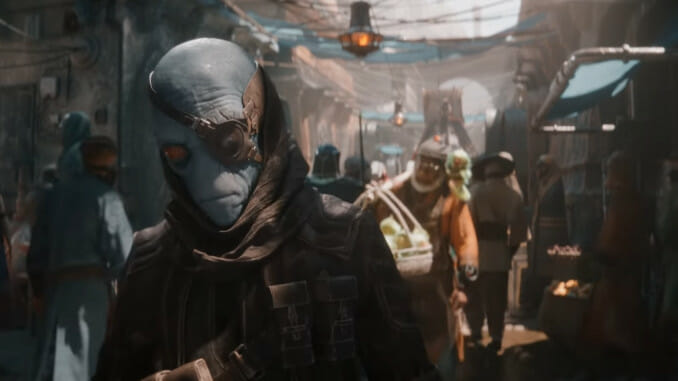Quantic Dream, who was at the heart of a scandal and several lawsuits regarding a toxic workplace culture, is developing the next big Star Wars game. Why is Disney working with Quantic Dream?
From 2012 until this year, EA had an exclusive license to Disney’s Star Wars properties. This led to a revival of the Battlefront series from DICE that got a mixed reception because of microtransactions. It also led to Respawn creating Star Wars Jedi: Fallen Order, a well-received mash-up of Uncharted and Dark Souls gameplay mechanics. After that came a well-received spiritual successor to the X-Wing, TIE Fighter and Rogue Squadron series called Star Wars: Squadrons. Nonetheless, Wired reported in January that Lucasfilm Games would be publishing a Ubisoft Star Wars title and an Indiana Jones game from Bethesda, meaning EA’s exclusive deal would be coming to an end.
Last week, the trailer for another Star Wars game that had been hinted at before was revealed. The High Republic, Disney-Lucasfilm’s attempt to create a new storytelling space away from the movies, is getting its first game. The trailer looks pretty cool:
Unfortunately, it’s being developed by Quantic Dream. Quantic Dream is a studio I mostly know for the allegorical narrative failures of Detroit: Become Human and for joining the ranks of major studios with alleged abusive workplace cultures in 2018, when a joint investigative report by three French newspapers (Le Monde, Mediapart, and Canard PC) revealed the company’s “toxic corporate culture, management with inappropriate words and attitudes, under-considered employees, overwhelming workloads and questionable contractual practices.” This behavior led to the entire IT department quitting in March 2017; studio management was forcing crunch time for a year before games launched; and HR was colluding to terminate contractors before their term ended.
Allegations of rampant sexism and racism led to Quantic Dream suing Le Monde and Mediapart for libel in 2018, with the trial occuring in May 2021 and the verdict in September. Quantic Dream won against Le Monde because Le Monde didn’t identify sources, and lost against Mediapart. In July 2018, Quantic Dream lost a court case against an employee who left due to the company practice of hanging pictures on the walls with employees and contractors photoshopped to look like Nazis and porn stars. In April 2021, the Court of Appeal of Paris reversed the wrongful termination ruling, ruling that the photos weren’t sufficietly bigoted or sufficiently tied to employees quitting.
Disney’s stewardship of the Lucasfilm license and the Star Wars properties has been interesting, perhaps even difficult, to appraise. The sequel trilogy was financially successful, but was rife with controversy from the worst fans on the internet drowning out any legitimate criticism of the centerpiece movie with their “anti-SJW” (racist and sexist) nonsense. The first film in the trilogy was essentially a remake of the original Star Wars; the last film was what happens when you build the whole plane out of fan service. Meanwhile, Rogue One was well-regarded while Solo was considered a failure. My own feelings notwithstanding, The Mandalorian is widely seen as successful, as was the Clone Wars revival and The Bad Batch. All of these stories take existing characters and situations and fill in gaps left in the storytelling of the movies; that is to say, rather than tread new ground narratively, they give fans what they have already proven to want.
The Star Wars franchise seems hemmed-in creatively by corporate interpretation of fan expectations. As a Star Wars fan, I feel like those expectations are bent out of shape by people with their identity too strongly tied up into this intellectual property.
Until this new trailer, the most exciting Star Wars videogame news this year was the announcement of a Knights of the Old Republic remake coming to PlayStation 5. The collective excitement over the trailer’s interesting visuals and epic soundscape was promptly dashed by the Quantic Dream logo, though, and the realization that this game is coming from the people behind Heavy Rain and Detroit: Beyond Human, and a studio with myriad allegations of a culture of abuse. There are three announced Star Wars games currently in development and two are from French developers with allegations of hostile work environments. Could no one else be convinced to make a Star Wars game?
There are other interesting developers, and auteur game directors, that don’t have these kinds of reputations. While we’re throwing ideas at the wall, are Kojima’s ideas too weird for a Star Wars game? Is BioWare too content with The Old Republic MMO to make a single-player Star Wars? What about Square Enix? Is the problem that so many big developers have been turned into first-parties by the console developers?
To make the next thing like Star Wars will likely require independent creators with vision given room to experiment with their ideas. To make the next great thing within Star Wars will require an independent creative team. To make the next great Star Wars game, the next thing that defines Star Wars in the interactive space, will require new people and new ideas. If Disney-Lucasfilm is going to limit their videogame output, it makes financial sense, if not creative sense, to insist on handing the reins to an established developer with an eye for interesting narrative approaches. Is the rot so deep in the industry that there are no intriguing developers that aren’t known for a culture of abuse?
Kevin Fox, Jr. is a freelance writer and Paste intern. He loves videogames, film, history, pop culture, sports, and human rights, and can be found on Twitter @kevinfoxjr.
